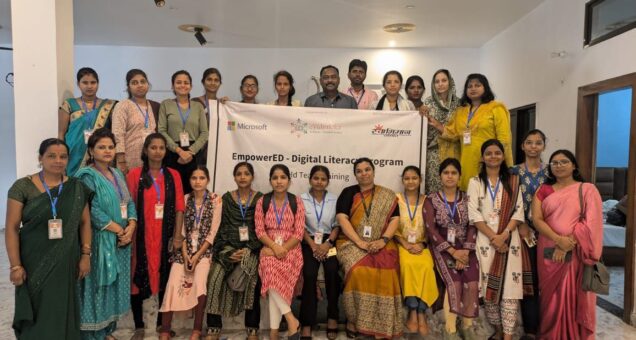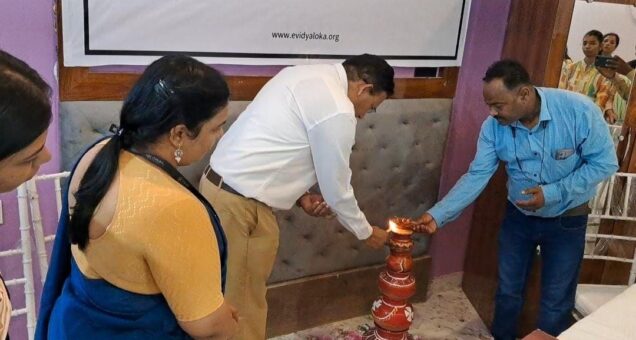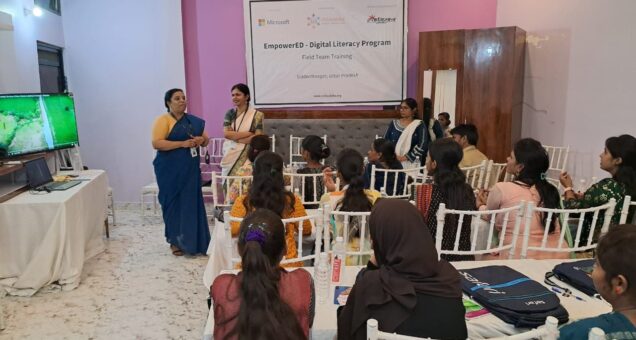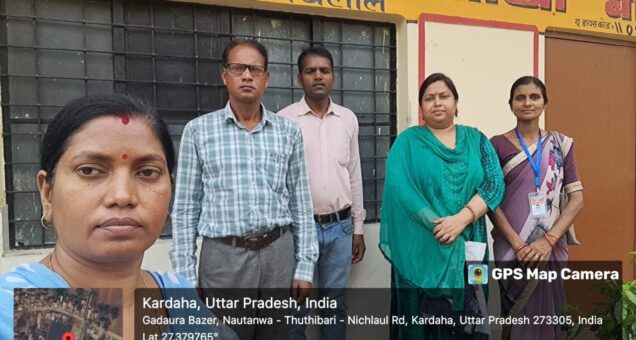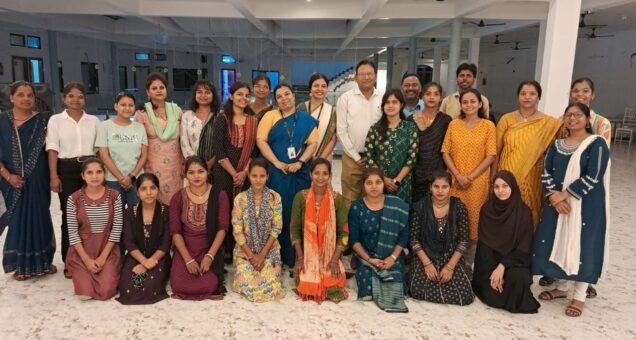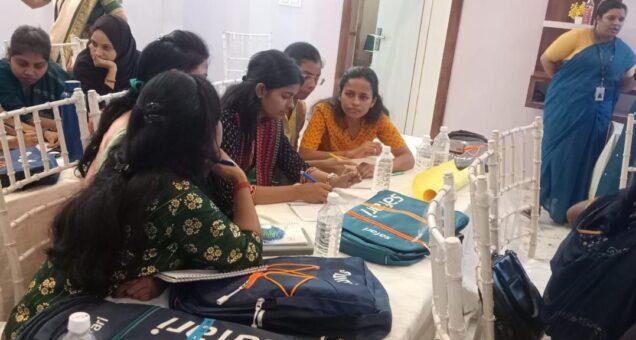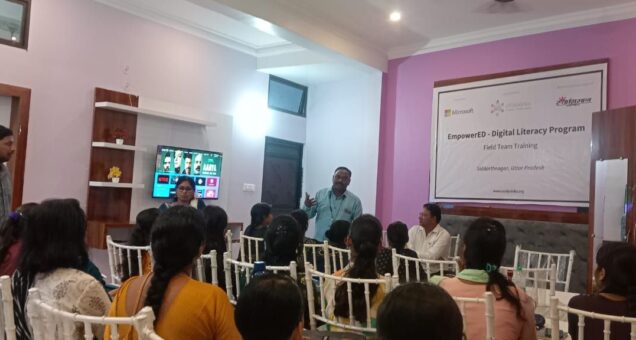EmpowerEd: Digital Literacy Program
The eVidyaloka EmpowerEd: Digital Literacy Program, launched by Swabhiman Samiti, is aimed at providing quality education to underserved students in rural India. By equipping schools with digital classrooms and enabling remote learning through volunteer teachers, this initiative addresses the challenges of limited access to qualified teachers and educational resources. The program is currently implemented in 20 KGBV schools in Siddharthnagar and Maharajganj districts of Uttar Pradesh, empowering young girls with education and bridging the digital divide.
Key Highlights:
- Targeted Schools: 20 Kasturba Gandhi Balika Vidyalaya (KGBV) schools in Siddharthnagar and Maharajganj districts.
- Focus Areas: STEM education, languages, and vocational training for grades 6-12.
- Digital Infrastructure: Equipped with computers, projectors, webcams, and reliable internet connectivity.
SS




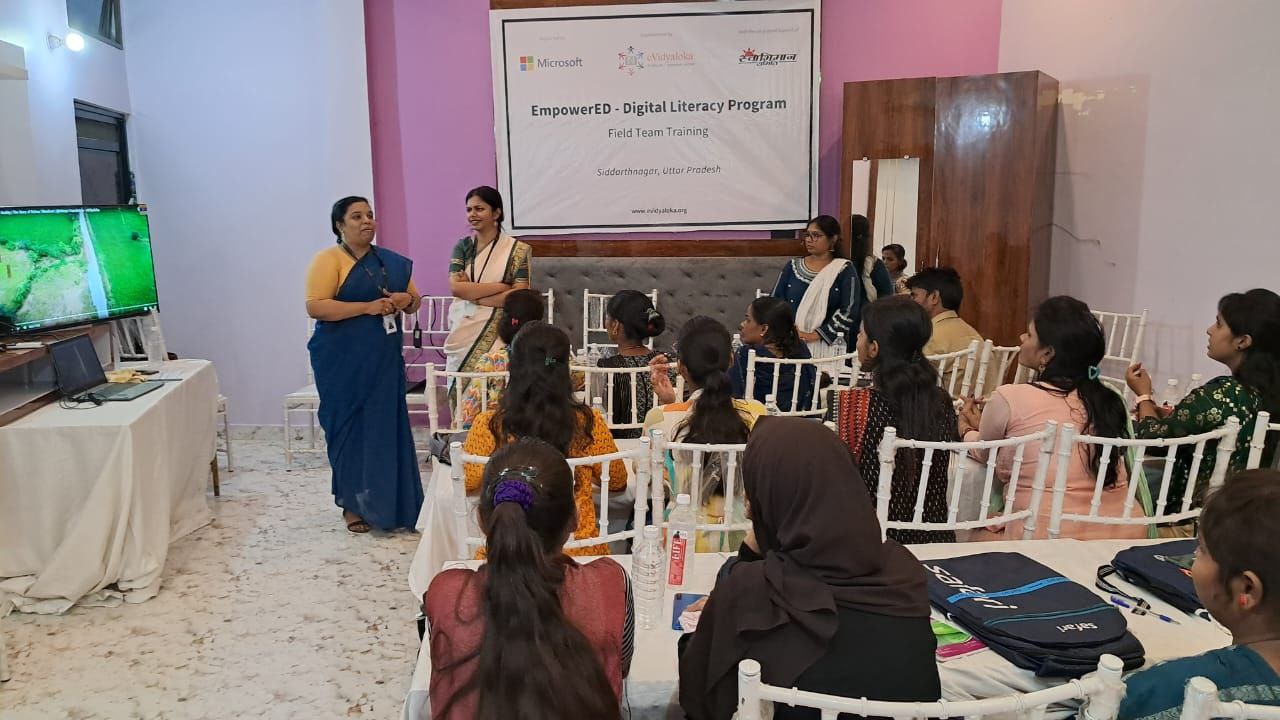

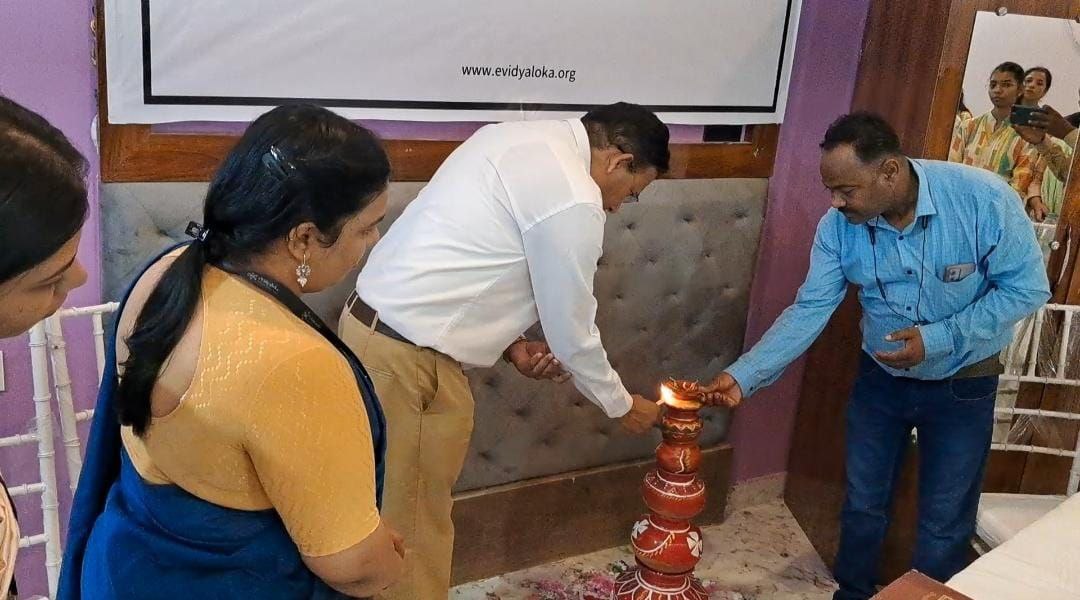
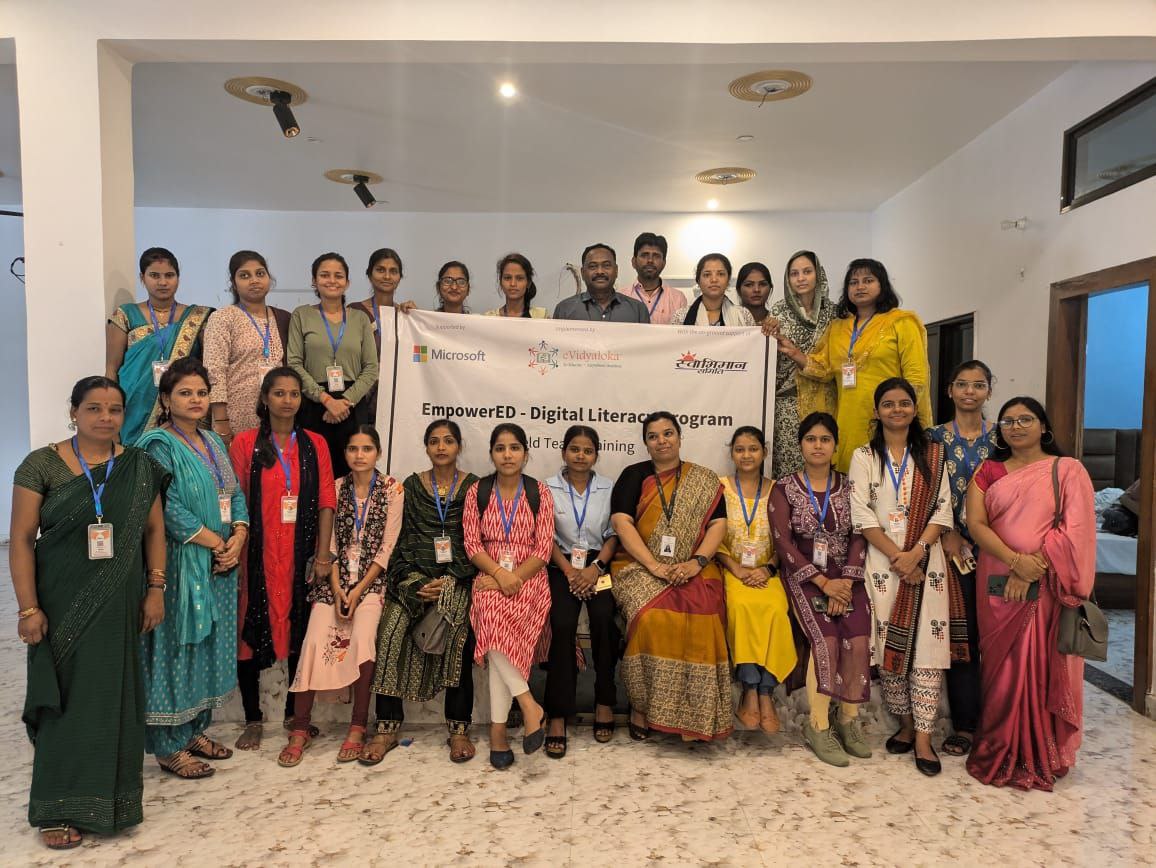
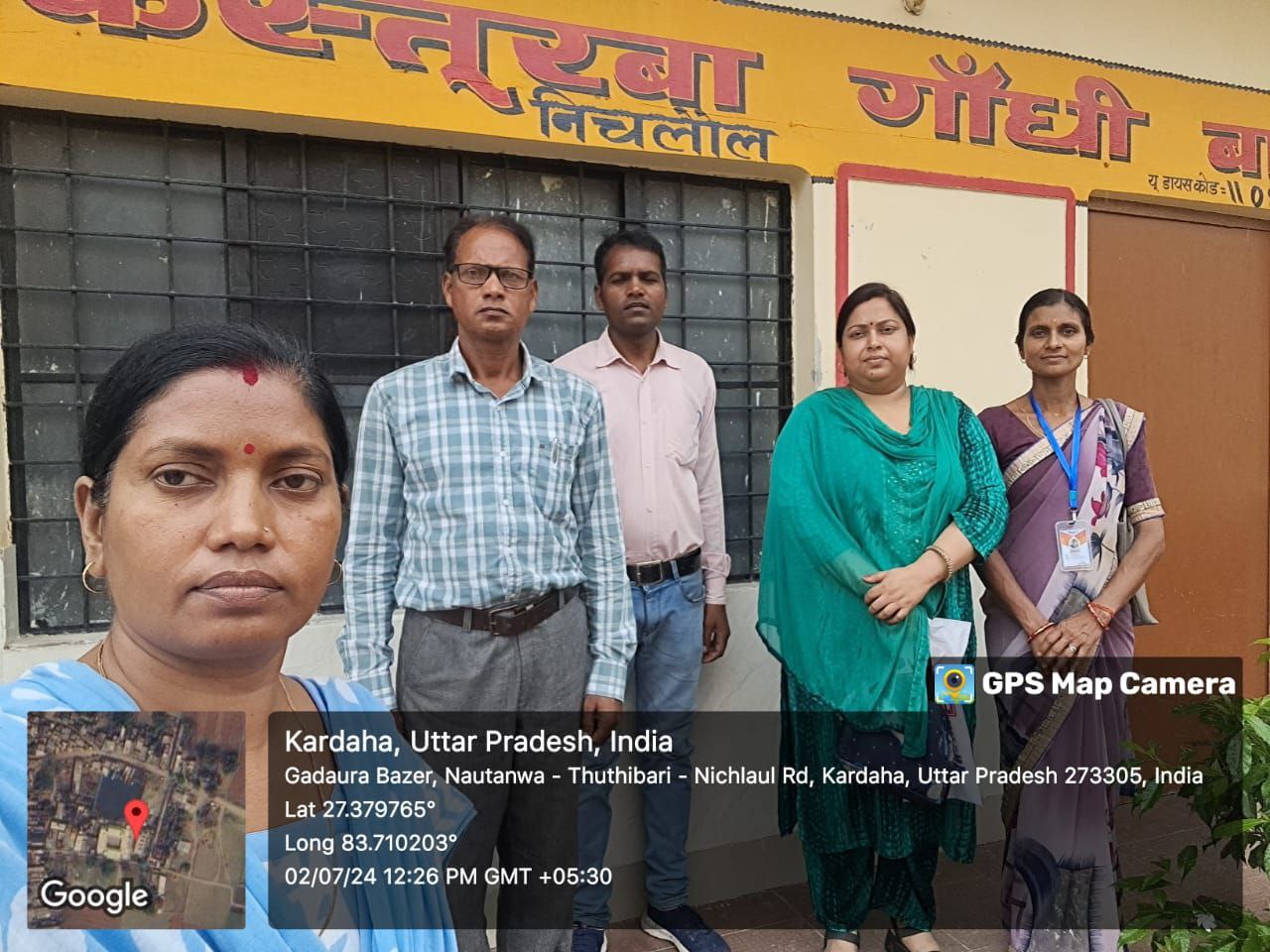

Project Details
- Project Name:
- eVidyaloka EmpowerEd: Digital Literacy Program
- Thematic Area:
- Education
- Outcome:
- All 20 schools have been equipped with the necessary technology, and online classes are now regularly conducted
Funded By
- Funder Name:
- eVidyaloka
- Implementing Body:
- Swabhiman Samiti
Implemented By
Work Place
- Place of Work:
- Siddharthnagar and Maharajganj District, Uttar Pradesh, India
- Year:
- 2024
Project Overview
The eVidyaloka EmpowerEd: Digital Literacy Program, led by Swabhiman Samiti, addresses the challenges faced by rural schools, including limited access to qualified teachers, inadequate infrastructure, and a lack of educational resources. The initiative focuses on equipping schools with digital classrooms and facilitating remote learning through volunteer teachers, thereby providing equitable education to students in rural areas. By integrating hardware, software, and reliable internet connectivity, the program ensures that students from these areas can access high-quality education.
The program is currently being implemented in 20 Kasturba Gandhi Balika Vidyalaya (KGBV) schools across Siddharthnagar and Maharajganj districts in Uttar Pradesh. It offers digital learning opportunities for young girls in underserved areas, with a focus on empowering them, promoting gender equality, and bridging the educational gap with urban areas.
Swabhiman Samiti is committed to improving educational access in regions where it remains a challenge, leveraging digital technology to enhance academic outcomes and empower students for success both academically and personally.
Objectives
The primary objectives of the eVidyaloka Digital Classroom Program are:
- Access to Quality Education: Provide underserved students in rural India with access to quality education through digital classrooms, reducing the digital divide.
- Teacher Training and Empowerment: Recruit and train volunteer teachers to conduct live online sessions, ensuring high-quality instructional delivery.
- Technological Integration: Create a sustainable digital ecosystem in schools to support online classes, digital content, and remote learning initiatives.
- Holistic Development: Use technology to enhance not only academic teaching but also extracurricular activities, providing a more rounded educational experience.
- Monitoring and Evaluation: Continuously monitor the program’s progress and make data-driven decisions for improvement.
- Capacity Building of Local Teams: Equip local field teams, class assistants, and school coordinators with the skills and knowledge required for smooth program operation.
Background and Rationale
Many rural and semi-urban areas in India face significant challenges in education due to a shortage of qualified teachers, outdated teaching methods, and limited access to digital learning resources. This leads to poor academic performance and limited educational opportunities for students.
The eVidyaloka Digital Classroom Program was designed to address these gaps by leveraging technology to offer a scalable solution. By using volunteer teachers from across India and equipping classrooms with essential digital tools, such as laptops, projectors, and internet connectivity, the program ensures that students in rural areas can access high-quality learning materials and skilled educators.
In addition, the program promotes holistic student development by offering extracurricular activities, career counseling, and interactive learning experiences, all of which are often absent in rural educational systems.
Planned Outreach
The initial phase of the program will cover 20 schools in rural areas. These schools will be equipped with digital infrastructure to support online learning. The target audience is students in grades 6 to 12, with a focus on subjects like STEM (Science, Technology, Engineering, and Mathematics), languages, and vocational education—areas typically underserved in rural schools.
The program is expected to scale over time by increasing the number of schools and expanding the curriculum to include additional subjects and activities. The initiative has the potential to reach thousands of students, improving educational outcomes and bridging the gap between rural and urban education systems.
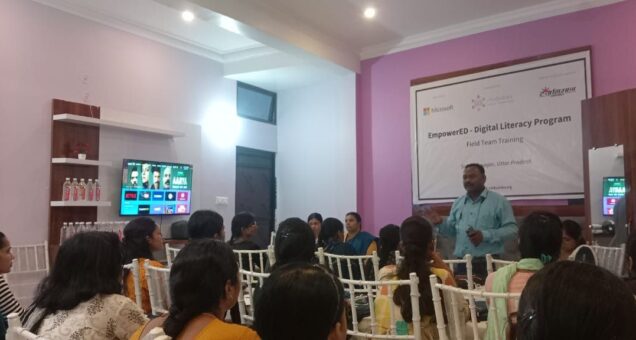
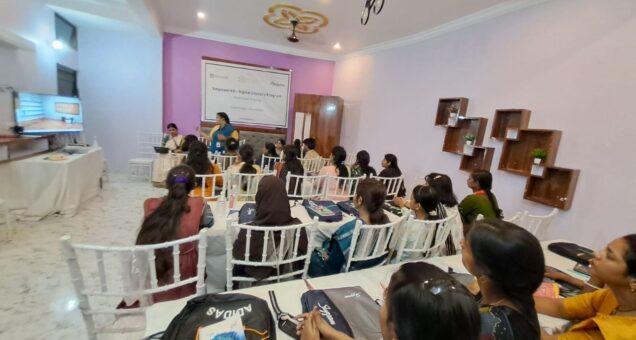
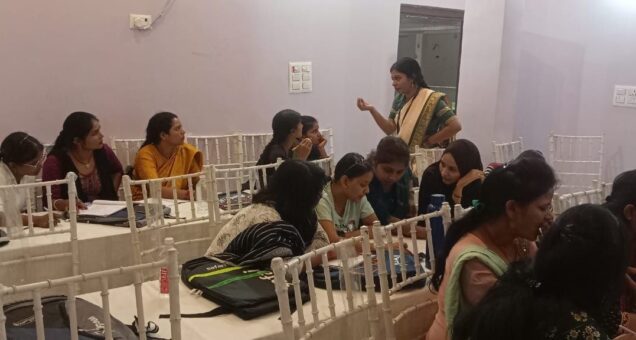
Key Strategies
The program’s success relies on the following strategies:
- Digital Infrastructure Setup: Equip schools with necessary tools, including computers, projectors, webcams, speakers, and reliable internet connectivity, to enable digital learning.
- Volunteer Teacher Recruitment: Identify and recruit qualified volunteer teachers for live online sessions, ensuring high educational standards.
- Training and Capacity Building: Organize training for local teams (Class Assistants and Field Coordinators) to manage daily operations and maintain the program’s efficiency.
- Regular Monitoring and Evaluation: Monitor the program’s progress, gather feedback from teachers, students, and parents, and adjust strategies as needed for improvement.
- Sustained Community Involvement: Engage the local community, including parents and school staff, to create a supportive environment for students.
Core Activities
The eVidyaloka Digital Classroom Program includes the following key activities:
- Digital Classroom Setup: Swabhiman Samiti will equip participating schools with infrastructure, including computers, projectors, webcams, speakers, and internet connectivity. Ensure reliable power backup and stable internet connectivity for uninterrupted classes.
- Volunteer Teacher Recruitment and Engagement: Identify and recruit qualified volunteer teachers for online teaching. Provide necessary training and resources for effective lesson delivery. Maintain regular engagement with teachers to ensure quality education.
- Classroom Facilitation: A Class Assistant will be assigned to each classroom to manage attendance, engage students, and assist with any technology-related issues. Coordinate with teachers to ensure lesson plans are followed.
- Monitoring and Evaluation: Conduct regular assessments to track the program’s effectiveness. Collect feedback from all stakeholders and make data-driven decisions for program enhancement. Track student progress and session completion through the Jupiter portal.
- Community Engagement: Organize Parent-Teacher Meetings (PTMs) to foster community involvement. Encourage local support for the program’s sustainability.
- Training Local Teams: Provide training to Class Assistants and Field Coordinators to ensure they understand their roles in classroom management and maintaining the digital infrastructure.
Expected Achievements and Outcomes
The eVidyaloka Digital Classroom Program has already achieved several significant milestones, including:
- Successful Deployment of Digital Infrastructure: All 20 schools have been equipped with the necessary technology, and online classes are now regularly conducted.
- Engagement of Volunteer Teachers: Volunteer teachers have actively participated in delivering online classes and providing academic support to students.
- Positive Feedback from Stakeholders: Schools, local authorities, and parents have expressed satisfaction with the program’s quality, and students have shown increased engagement.
- Capacity Building of Field Teams: Training for Field Coordinators and Class Assistants has ensured smooth program operation.
- Monitoring and Reporting System: The Jupiter portal has facilitated effective tracking of student progress, class schedules, and session completion.
Conclusion
The eVidyaloka EmpowerEd: Digital Literacy Program, implemented by Swabhiman Samiti, has successfully addressed the digital education challenges in rural India. Through the provision of technology, volunteer teachers, and training for local staff, the program has created a sustainable model for improving educational outcomes in underserved areas.
The program has positively impacted student learning, encouraged community involvement, and improved the overall educational experience. As Swabhiman Samiti expands the initiative, it is well-positioned to bring transformative change to rural education. With continued support and collaboration, the program will play a significant role in narrowing the educational gap between rural and urban India.
